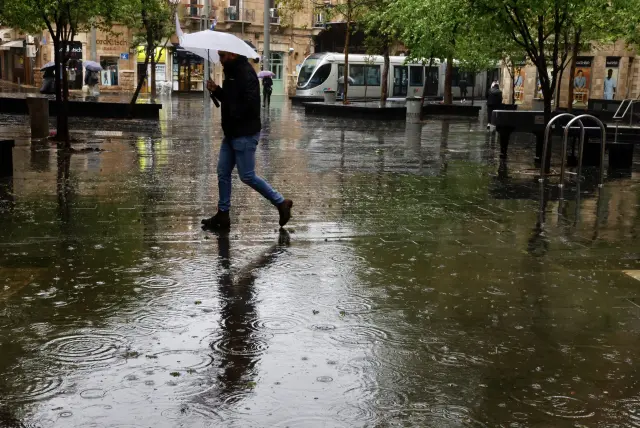Compare and contrast: These Weeks in Jewish Life to These Weeks of Covid-19

Today is the 29th day of the omer -- it has been more than 4 weeks since our 1st Pesach seder; about 7 weeks of coronavirus quarantine. We are 4 days from Lag b-omer, the 33rd day of the omer. (no tachanun on Tuesday)
This is a period of counting -- We count 49 days from the second night of Pesach -- counting the "omer" -- the 50th day is one of three Pilgrimage holydays -- Shavu'ot. We also have been counting days and weeks of COVID-19.
In the Jewish calendar this period includes 3 overlapping events:
Counting 7 weeks from Pesach to Shavu’ot.
As the new grain ripens, the first grain is offered to God, Temple, Kohanim -- it is then permitted for us to enjoy.
The death of R Akiva's students; the deaths ceased on Lag b-omer, which is why it is a celebratory day.
1 -- Holydays -- The two other Pilgrimage festivals are dated by the moon, the full moon, the 15th of the month -- Pesach (15 Nissan) and Succot (15 Tishrei). Each are 7-day festivals (8 days outside the land of Israel.). (Shavu'ot is celebrated for 1 day (2 outside the land of Israel) and is dated seven weeks after Pesach, which gives it its name -- Shavu'ot means "weeks."
2 -- Agriculture -- The new grain of barley, the first grain to ripen, had to be desacralized, that is, religiously permitted to each person to eat all grain. As the new grain began to sprout, a small portion was taken to the Beit ha-Mikdash, Temple. The minimum amount was an "omer" -- a "sheaf," i.e, a bundle of stalks, bound together after reaping; this is how the name became known as "Counting the Omer." On the 50th day, the second offering of meal of new wheat, baked into leavened loaves, is offered in the sanctuary as בכורים / bikkurim, “first fruits.”
3. R Akiva's students' death are recorded in the Talmud.
It was said that Rabbi Akiva had 12,000 pairs of disciples … all of them died at the same time, because they did not treat each other with respect.
The world remained desolate [of Torah] until Rabbi Akiva came to our rabbis in the south and taught them Torah.
These were Rabbi Meir, Rabbi Yehuda, Rabbi Yossi, Rabbi Shimon and Rabbi Elazar ben Shammua, and it was they who revived the Torah at that time.
A tanna taught: All of them died between Passover and Shavuot. Rabbi Chama bar Abba, or some say Rabbi Chiya bar Avin, said: All of them died a cruel death.
What was it? Rabbi Nachman replied: Croup.
A careful study of this passage leads to several observations and questions:
Why does the Talmud record "12,000 pairs" -- why not just say "24,000"?
Is the record hinting that the number was symbolic or was it actually 12,000?
Coronavirus deaths over the past 6 months (2 months+ in the US) as of today:
World -- 271,989 out of 7.8 billion
US: 77,059 out of 325,000+
Israel: 245 out of 9,000+ million
R Akiva’s students? Population then? Of only students?
How did R Akiva's students die?
The Talmud states a disease and a later rabbi specifically says: Croup
b. But this was the time of wars with Rome -- was it Roman soldiers, PC preserved?
c. The Talmud provides a moral answer: They did not treat each other with respect.
d. If it was a disease, then why advance the moral angle "they did not treat each other with respect"? If the deaths were due to moral shortcomings, then why state and further identify the disease?
Is a purely scientific approach too much -- is there a moral or a divine element or both?
Is religion too much -- are some religious leaders minimizing the science?
And is the science pure science, or are human elements, and human judgments a larger part of the science than we think?
6. Are there limits to science? There are some who are contending that we may never eradicate Covid-19, just as we have not some other diseases; on the other hand, we have in fact rendered certain diseases virtually nil -- small pox, polio.
I believe science has its place and will succeed, largely so.
I believe there is an important place for religion, particularly Torah.
Finally -- Psalm 91 -- I have applied a verse from this Psalm at shul in my prayer for those who are traveling each week:
Psalm 91 begins: "You who dwell in the shelter of God -- He is my refuge and stronghold ... and continues, “No harm will befall you; no disease will enter your tent, for He will order His angels to guard you wherever you go."
We live in a scientific age -- I can’t bring myself to think that this is divine retribution and so I am not advocating it.
But neither in this scientific age can I see things only in scientific terms.
This pandemic or plague -- offers the opportunity for more than science alone
Genuine prayer, faith amidst struggle, opportunities for good deeds, living a moral life, not just a popular one, loyalty to our people and our heritage especially when we have to cut against the grain of our culture, and specifically, as we recall the lesson imparted from the Talmud -- treating each other with respect.
As Lag b-omer unexpectedly ended the death's of R Akiva's students, so may our Lag b-omer come soon -- with the help of our scientists, with our cooperation and patience, and with God's help.






















